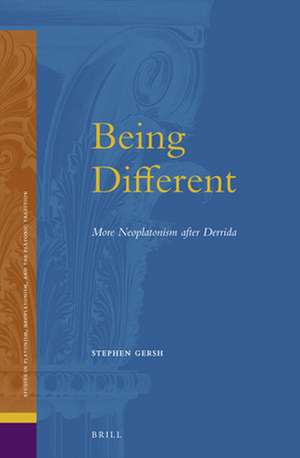Being Different: More Neoplatonism after Derrida: Studies in Platonism, Neoplatonism, and the Platonic Tradition, cartea 16
Autor Stephen E. Gershen Limba Engleză Hardback – 28 noi 2013
Din seria Studies in Platonism, Neoplatonism, and the Platonic Tradition
- 18%
 Preț: 919.38 lei
Preț: 919.38 lei - 18%
 Preț: 786.03 lei
Preț: 786.03 lei - 18%
 Preț: 583.61 lei
Preț: 583.61 lei - 18%
 Preț: 650.61 lei
Preț: 650.61 lei - 18%
 Preț: 1253.98 lei
Preț: 1253.98 lei - 18%
 Preț: 600.17 lei
Preț: 600.17 lei - 18%
 Preț: 585.95 lei
Preț: 585.95 lei - 18%
 Preț: 813.53 lei
Preț: 813.53 lei - 18%
 Preț: 760.55 lei
Preț: 760.55 lei - 18%
 Preț: 921.89 lei
Preț: 921.89 lei - 18%
 Preț: 576.07 lei
Preț: 576.07 lei - 18%
 Preț: 640.09 lei
Preț: 640.09 lei - 18%
 Preț: 797.09 lei
Preț: 797.09 lei - 18%
 Preț: 853.04 lei
Preț: 853.04 lei - 18%
 Preț: 645.03 lei
Preț: 645.03 lei - 18%
 Preț: 976.26 lei
Preț: 976.26 lei - 15%
 Preț: 422.90 lei
Preț: 422.90 lei - 18%
 Preț: 815.23 lei
Preț: 815.23 lei - 18%
 Preț: 684.59 lei
Preț: 684.59 lei - 18%
 Preț: 1256.08 lei
Preț: 1256.08 lei - 18%
 Preț: 866.31 lei
Preț: 866.31 lei - 18%
 Preț: 792.09 lei
Preț: 792.09 lei - 18%
 Preț: 715.01 lei
Preț: 715.01 lei - 18%
 Preț: 907.42 lei
Preț: 907.42 lei - 18%
 Preț: 681.05 lei
Preț: 681.05 lei - 18%
 Preț: 715.65 lei
Preț: 715.65 lei
Preț: 683.39 lei
Preț vechi: 833.41 lei
-18% Nou
Puncte Express: 1025
Preț estimativ în valută:
130.81€ • 142.13$ • 109.95£
130.81€ • 142.13$ • 109.95£
Carte indisponibilă temporar
Doresc să fiu notificat când acest titlu va fi disponibil:
Se trimite...
Preluare comenzi: 021 569.72.76
Specificații
ISBN-13: 9789004261402
ISBN-10: 9004261400
Pagini: 249
Dimensiuni: 155 x 235 x 25 mm
Greutate: 0.68 kg
Editura: Brill
Colecția Brill
Seria Studies in Platonism, Neoplatonism, and the Platonic Tradition
ISBN-10: 9004261400
Pagini: 249
Dimensiuni: 155 x 235 x 25 mm
Greutate: 0.68 kg
Editura: Brill
Colecția Brill
Seria Studies in Platonism, Neoplatonism, and the Platonic Tradition
Notă biografică
Stephen Gersh is Professor of Medieval Studies and Concurrent Professor of Philosophy at the University of Notre Dame. He is the author of numerous books on the history of the Platonic tradition including Neoplatonism after Derrida: Parallelograms (Brill, 2006).
Recenzii
"Being Different is an appropriate sequel [to Neoplatonism after Derrida: Parallelograms], bringing in new players (Augustine, Damascius, Mallarmé) to revisit many of the problems explored in the first volume, while ultimately steering the inquiry into the tantalizing questions of the “performative utterance” and verbal theurgy. Dylan Burns, Bryn Mawr Classical Review 2014.10.36.
